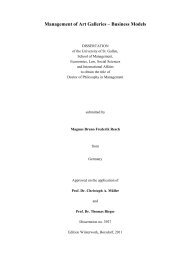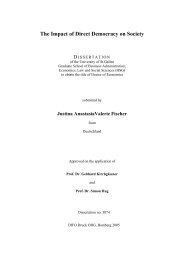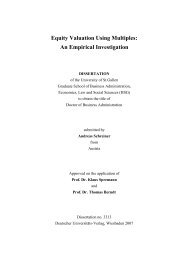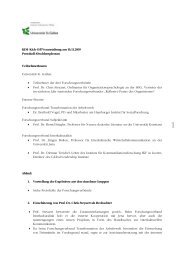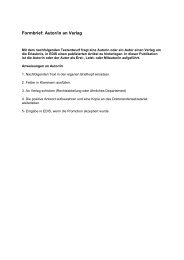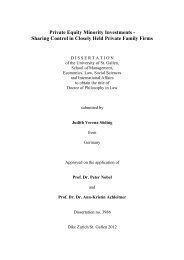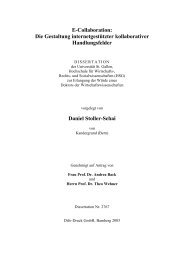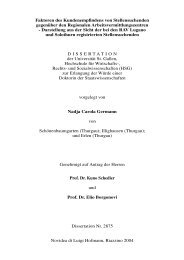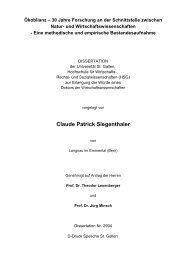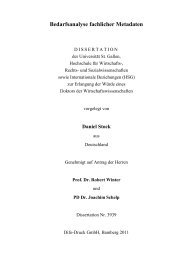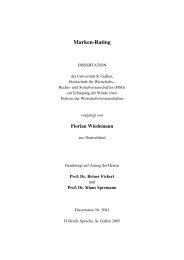- Page 1 and 2: Agency Assurance: The Role of the A
- Page 3 and 4: Acknowledgements I am very fortunat
- Page 5: To Tina
- Page 8 and 9: ii 2.2.4 The Communication Axis 28
- Page 10 and 11: iv 6.1.7 Agency Cost Effectiveness
- Page 12 and 13: vi 9.4.1 Transaction Cost Theory 20
- Page 14 and 15: viii 12.8 Returning to Audited Fina
- Page 16 and 17: x Figures 1-1 Corporate Governance
- Page 18 and 19: xii Tables 1-1 Pay for Performance
- Page 20 and 21: xiv Abbreviations AICPA a.k.a. CA C
- Page 22 and 23: xvi WTO www XBRL XML World Trade Or
- Page 24 and 25: 2 that corporation to regain their
- Page 26 and 27: 4 new role as powerful centralized
- Page 28 and 29: 6 Other international leaders, howe
- Page 30 and 31: 8 Table 1-3. Reforms proposed versu
- Page 34 and 35: 12 1.2.2 Systemic Conflicts of Inte
- Page 36 and 37: 14 board structures providing leade
- Page 38 and 39: 16 Audits have become a loss-leadin
- Page 40 and 41: 18 “The Big Winner, Again, Is ‘
- Page 42 and 43: 20 That is, as owners who remain in
- Page 44 and 45: 22 management). 5 The American Inst
- Page 46 and 47: 24 their individual qualifications,
- Page 48 and 49: 26 reporting.” 11 The same study,
- Page 50 and 51: 28 itself into a rules-based system
- Page 52 and 53: 30 CFO’s (chief financial officer
- Page 54 and 55: 32 Signalling theory identifies fac
- Page 57 and 58: 35 CHAPTER 3. Constitution - The Au
- Page 59 and 60: 37 To understand further the logica
- Page 61 and 62: 39 3.2 Stakeholder Roles and Respon
- Page 63 and 64: 41 quantitative approach combined w
- Page 65 and 66: 43 Figure 3-1. Two Contrasting Appr
- Page 67 and 68: 45 Executive stock ownership - when
- Page 69 and 70: 47 or it increases the equity dilut
- Page 71 and 72: 49 member being a member of managem
- Page 73 and 74: 51 to-day management of individual
- Page 75 and 76: 53 CHAPTER 4. Constitution - The Re
- Page 77 and 78: 55 investors being driven by quarte
- Page 79 and 80: 57 to government authorities. From
- Page 81 and 82: 59 better measurement for evaluatin
- Page 83 and 84:
61 costs, especially residual losse
- Page 85 and 86:
63 This oversight function is typic
- Page 87 and 88:
65 The NYSE and NASD rules continue
- Page 89 and 90:
67 in entirety for that matter, is
- Page 91 and 92:
69 is reproduced in Appendix 3. 32
- Page 93 and 94:
71 “the Commission believes that
- Page 95 and 96:
73 organization. This is the percei
- Page 97 and 98:
75 pressure on boards’ recruitmen
- Page 99 and 100:
77 number of directors, as shown on
- Page 101 and 102:
79 In the few years following the s
- Page 103 and 104:
81 government has moved in the dire
- Page 105 and 106:
83 term. It directs more board reso
- Page 107 and 108:
85 CHAPTER 5. Constitution - The Ri
- Page 109 and 110:
87 outright fraud. Some of the prof
- Page 111 and 112:
89 Section 404 of the Sarbanes-Oxle
- Page 113 and 114:
91 data collected and analyzed. How
- Page 115 and 116:
93 Case Review 5-1 Financial Manage
- Page 117 and 118:
95 the gains for managers from high
- Page 119 and 120:
97 many years, not only as a result
- Page 121 and 122:
99 Jack Welch, the much heralded le
- Page 123 and 124:
101 options for future compensation
- Page 125 and 126:
103 equity class, which in its key
- Page 127 and 128:
105 1978 report identified the prob
- Page 129 and 130:
107 making clearly transparent warn
- Page 131 and 132:
109 field of management accounting,
- Page 133 and 134:
111 office. Although it is importan
- Page 135 and 136:
113 CHAPTER 6. Constitution - The I
- Page 137 and 138:
115 model is joint responsibility f
- Page 139 and 140:
117 continuously entered into the e
- Page 141 and 142:
119 “efficient allocation of risk
- Page 143 and 144:
121 The chart shows compellingly th
- Page 145 and 146:
123 firms to be solicited for polit
- Page 147 and 148:
125 in newspaper stock listings the
- Page 149 and 150:
127 Case Review 6-3. Allianz Dresdn
- Page 151 and 152:
129 managers, as well, generally do
- Page 153 and 154:
131 element in a constructive activ
- Page 155 and 156:
133 CHAPTER 7. Classification in th
- Page 157 and 158:
135 This is why auditors are asked
- Page 159 and 160:
137 products and services from comp
- Page 161 and 162:
139 influenced by accounting standa
- Page 163 and 164:
141 contact with consumers and prov
- Page 165 and 166:
143 supervisors, as well as any mac
- Page 167 and 168:
145 with products is increasingly m
- Page 169 and 170:
147 ownership rights that are quite
- Page 171 and 172:
149 dollars in trading derivatives
- Page 173 and 174:
151 Although there are many benefit
- Page 175 and 176:
153 Reinvestment and new investment
- Page 177 and 178:
155 7.5 Agency Assurance Addresses
- Page 179 and 180:
157 Transactions for acquiring or p
- Page 181 and 182:
159 of financial statements are lef
- Page 183 and 184:
161 4.) the Statement of Cash Flows
- Page 185 and 186:
163 CHAPTER 8. Classification for I
- Page 187 and 188:
165 Because the authors consider th
- Page 189 and 190:
167 Figure 8-1. Classification Axis
- Page 191 and 192:
169 Michael Polanyi in his seminal
- Page 193 and 194:
171 assets have the potential to be
- Page 195 and 196:
173 - can be transferred separately
- Page 197 and 198:
175 Figure 8-2. Intellectual Capita
- Page 199 and 200:
177 expect any accounting standard
- Page 201 and 202:
179 This large market correction sh
- Page 203 and 204:
181 streams to a net present value
- Page 205 and 206:
183 negotiation ability, despite si
- Page 207 and 208:
185 “Definitions—The item meets
- Page 209 and 210:
187 Anyone who has actually led a b
- Page 211 and 212:
189 disclosure. These groups match
- Page 213 and 214:
191 CHAPTER 9. Classification as a
- Page 215 and 216:
193 Properly trained and certified
- Page 217 and 218:
195 The authors of a recent study s
- Page 219 and 220:
197 could even convince them to exp
- Page 221 and 222:
199 product based on a total produc
- Page 223 and 224:
201 telephone sales, and Packard Be
- Page 225 and 226:
203 as suppliers to each other and
- Page 227 and 228:
205 Revenue is a first, key indicat
- Page 229 and 230:
207 Gross profit is not just an int
- Page 231 and 232:
209 begin in the first quarter and
- Page 233 and 234:
211 and is fully amortized. Total r
- Page 235 and 236:
213 significantly by a system which
- Page 237 and 238:
215 6. Categorization as investment
- Page 239 and 240:
217 Expensing of stock options was
- Page 241 and 242:
219 favorable, and the share prices
- Page 243 and 244:
221 CHAPTER 10. Communication - Dis
- Page 245 and 246:
223 Case Review 10-1. Quality and Q
- Page 247 and 248:
225 The main lesson that Computer A
- Page 249 and 250:
227 Based Reporting systems promulg
- Page 251 and 252:
229 intense conflicts of interest f
- Page 253 and 254:
231 also to earlier research by Chi
- Page 255 and 256:
233 assessment and analysis of busi
- Page 257 and 258:
235 A number of the Manchester area
- Page 259 and 260:
237 the SEC when it was reasonable
- Page 261 and 262:
239 JAVA are required to participat
- Page 263 and 264:
241 The internet embodies the techn
- Page 265 and 266:
243 6. Warnings, alerts, and urgent
- Page 267 and 268:
245 CHAPTER 11. Communications for
- Page 269 and 270:
247 11.2 Strategic Credibility - Il
- Page 271 and 272:
249 the questionnaire instruments n
- Page 273 and 274:
251 public releases, the analysts a
- Page 275 and 276:
253 direct interests to the underst
- Page 277 and 278:
255 is also legally bound to refrai
- Page 279 and 280:
257 The bank’s clients are the ac
- Page 281 and 282:
259 weeks of time, certainly not mo
- Page 283 and 284:
261 members, including the chief ex
- Page 285 and 286:
263 same market space. They also ca
- Page 287 and 288:
265 dissatisfaction over Apartheid,
- Page 289 and 290:
267 As was related earlier, Higgins
- Page 291 and 292:
269 CHAPTER 12. Communications Fail
- Page 293 and 294:
271 rules have been added to accoun
- Page 295 and 296:
273 partnerships. They simultaneous
- Page 297 and 298:
275 Case Review 12-1. Special Rules
- Page 299 and 300:
277 The AICPA was compelled to issu
- Page 301 and 302:
279 unfavorable opinions to the ear
- Page 303 and 304:
281 Inflated historical profits in
- Page 305 and 306:
283 industry. As might be expected,
- Page 307 and 308:
285 strategies leading edge compani
- Page 309 and 310:
287 financial statements are reliab
- Page 311 and 312:
289 of valuation models in preparin
- Page 313 and 314:
291 short-term results.” 21 Manag
- Page 315 and 316:
293 years” with stricter disclosu
- Page 317 and 318:
295 improvements in economic prospe
- Page 319 and 320:
297 to cover the cost of capital of
- Page 321 and 322:
299 in revenues and profits or impr
- Page 323 and 324:
301 CHAPTER 13. Agency Assurance an
- Page 325 and 326:
303 The contemporary corporate form
- Page 327 and 328:
305 13.2.3 Monitoring The second st
- Page 329 and 330:
307 making, which provided a voice
- Page 331 and 332:
309 Directors and managers are chal
- Page 333 and 334:
311 triaxial framework for accompli
- Page 335 and 336:
313 audit committee can take the le
- Page 337 and 338:
315 A critical contradiction in acc
- Page 339 and 340:
317 resulting higher book value of
- Page 341 and 342:
319 Executives simply should never
- Page 343 and 344:
321 Just a few weeks later, Ford an
- Page 345 and 346:
323 boards, and owners, may be a go
- Page 347 and 348:
325 Now they must subject themselve
- Page 349 and 350:
327 earnings or to overstate the co
- Page 351 and 352:
329 telltale sign that intransparen
- Page 353 and 354:
331 13.7 Final Statement The conclu
- Page 355 and 356:
333 performance of the company.’
- Page 357 and 358:
335 APPENDIX 1. ICGN APPROACH TO TH
- Page 359 and 360:
337 APPENDIX 2. GOOD PRACTICE GUIDE
- Page 361 and 362:
339 Areas Requiring Special Attenti
- Page 363 and 364:
341 APPENDIX 3. AUDIT COMMITTEE CHA
- Page 365 and 366:
343 8. Assure that the auditor’s
- Page 367 and 368:
345 The AICPA Audit Committee Toolk
- Page 369 and 370:
347 The AICPA Audit Committee Toolk
- Page 371 and 372:
349 The AICPA Audit Committee Toolk
- Page 373 and 374:
351 The AICPA Audit Committee Toolk
- Page 375 and 376:
353 The AICPA Audit Committee Toolk
- Page 377 and 378:
355 The AICPA Audit Committee Toolk
- Page 379 and 380:
357 The AICPA Audit Committee Toolk
- Page 381 and 382:
359 Appendix 6. Skandia Value Schem
- Page 383 and 384:
361 Appendix 8. Ernst & Young Measu
- Page 385 and 386:
363 BIBLIOGRAPHY Aboody, David and
- Page 387 and 388:
365 on Improving the Effectiveness
- Page 389 and 390:
367 Conger, Jay A.; Finegold, David
- Page 391 and 392:
369 The Economist (2005-2) Too many
- Page 393 and 394:
371 Gustin, Sam (2005) Grasso deal
- Page 395 and 396:
373 Johnson, Jonathan L.; Daily, Ca
- Page 397 and 398:
375 LoBue, Robert (2004) Corporate
- Page 399 and 400:
377 Morris, Richard D. (1987) Signa
- Page 401 and 402:
379 Petty, Richard and Guthrie, Jam
- Page 403 and 404:
381 Securities and Exchange Commiss
- Page 405 and 406:
383 Tushman, Michael L. and O'Reill
- Page 407:
ROBERT M. LO BUE West Chester, PA U



